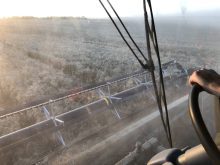Canadian National Railway (CN) has labour peace with its signals and communications workers through to the end of 2024 coming out of binding arbitration.
The 750-odd workers, represented by International Brotherhood of Electrical Workers (IBEW) System Council 11, had agreed to take their dispute with CN to arbitration in early July, ending a 17-day strike.
CN on Oct. 11 said arbitration has concluded in a three-year collective agreement with IBEW, retroactive to Jan. 1, 2022 through to Dec. 31, 2024.
The agreement includes a three per cent wage increase for each of 2022, 2023 and 2024, Montreal-based CN said in a release.
Read Also

Farmers expected to boost canola area beyond Statistics Canada intentions report
Canadian farmers might plant more canola acres than the 21.8 million that Statistics Canada reported in its seeding intentions report released on Thursday morning, analysts told Reuters.
IBEW members at CN install and maintain signals and trackside equipment, including the warning systems at railroad-highway crossings.
Unlike some other railway labour disputes in recent years — such as the eight-day strike by CN’s Teamster-led conductors and railyard workers in 2019 — the IBEW strike did not directly affect rail traffic, as CN had an “operational contingency plan” in place while unionized signals staff were off the job.
CN’s chief operating officer Rob Reilly, in the company’s release, said it’s “satisfied to have concluded this arbitration” and will “continue to focus on implementing a back-to-basics approach by running a scheduled operation, aligning capacity with demand.” — Glacier FarmMedia Network
















